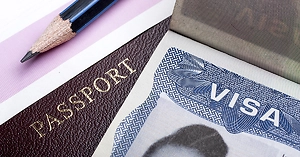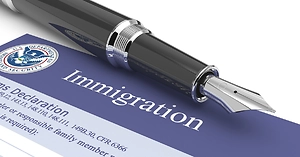On March 23, 2020, we wrote about the impact of the global pandemic on travel between the United States and neighboring countries, in COVID-19: How Does the Outbreak Affect Travel Between the United States and Mexico or Canada? We explained that the US, Mexican and Canadian governments had agreed to close their contiguous borders between March 20 and April 20, 2020, and then reassess whether borders should be reopened depending on the progress of the pandemic.
On March 30, 2020, we wrote about “satisfactory departure” in COVID-19: How Does the Outbreak Affect Visa Waiver (ESTA) Travelers? As we explained, visitors to the US who arrive under the Visa Waiver program who cannot depart within 90 days due to the pandemic may request a 30-day “satisfactory departure” period from US Customs & Border Protection by email.
On April 13, 2020, US Citizenship & Immigration Services announced it would begin taking requests for satisfactory departure by phone while its local field offices remain closed during COVID-19. Visa Waiver travelers ...
Unemployment insurance, as described in a recent blog post by our Labor and Employment colleagues, is a “joint federal-state program, administered separately by each state following guidelines established by federal law.” While the requirements of these programs vary from state to state, eligibility criteria generally exclude nonimmigrants whose work authorization is tied to a specific position with a specific employer (e.g., TN, H-1B, and L-1 workers).
President Trump signed the eagerly awaited Coronavirus Aid, Relief, and Economic Security (CARES) Act on March 27, 2020. What does it mean for people who are affected by COVID-19 and living here on work-authorized visas? They, like their colleagues who are US citizens and permanent residents, have also been furloughed without pay, laid off, and affected by university closures. But, unlike their colleagues, nonimmigrant workers are also at risk of involuntarily violating or even losing their US immigration status during COVID-19. To understand why, see our earlier blog, COVID-19: How Do Furloughs Affect Nonimmigrant Workers? Unfortunately, the Act is silent on the fate of these workers. While it provides general relief that may also aid nonimmigrants, their eligibility for that relief is not entirely clear.
The COVID-19 pandemic has disrupted travel across the globe. Many US travelers who entered under the Visa Waiver Program (commonly called “ESTA,” the acronym for the online pre‑authorization system) now find themselves on the horns of a dilemma: leave at the end of their 90-day authorized stay and thus endanger their own health and potentially that of others, or overstay due to COVID-19 travel restrictions.
In response to the COVID-19 crisis, US authorities are announcing a number of significant changes that impact everyone who relies on immigration programs to operate businesses or to live and work in the United States. Companies and their sponsored employees should be aware of the following changes announced within the past week:
UPDATE: Law360 posted a version of this article as Expert Analysis on March 31, 2020.
As employers throughout the United States increasingly move to remote work arrangements for employees, they are confronted with challenges in completing Form I-9. An employer must inspect an employee’s original identity and employment authorization documents in the physical presence of the employee within 3 business days after employment begins. For remote hires, and for reverification of current employees working remotely, government agencies have relaxed some I-9 requirements and companies are developing temporary procedures to ensure compliance during the COVID-19 crisis.
Employers nationwide are implementing work reductions, closures and furloughs in order to reduce costs during the COVID-19 economic slowdown in the United States. When employees are put on reduced hours or furloughed, employers face changing legal obligations in multiple areas of labor and employment law. Companies that employ nonimmigrant workers should not overlook the additional legal obligations they have toward these employees, especially those who are on visas that have prevailing wage requirements.
In response to the ongoing COVID-19 outbreak, multiple travel restrictions are in effect for travel in and out of the United States and its neighboring countries.
Employers, already dealing with a chaos of urgent-action items caused by COVID-19, must not overlook the stringent posting requirements under US Department of Labor (DOL) regulations for employees in H‑1B, H-1B1, and E-3 status, and for all employees, regardless of status, who are being sponsored for green cards through labor certification (“PERM”).
Search
Recent Posts
Categories
- Adjustment of Status
- Asylum
- Business Immigration
- CBP
- CIS
- Consular Processing
- Court Decisions
- COVID-19
- DED
- Deferred Action
- DHS
- DOL
- E-Verify
- EAD
- Enforcement
- F-1
- Federal Agencies
- Federal Laws/Legislation
- Global Immigration
- H-1B
- H-2B
- Homeland Security
- Humanitarian Relief
- I-9
- ICE
- Immigrant Visas
- L-1
- Labor Certification
- Legislation
- Naturalization
- News & Events
- Nonimmigrant Visas
- Other
- Processing Times
- REAL ID
- Refugees
- SSA
- State Department
- State Laws/Legislation
- TN
- TPS
- US Embassies
- USCIS
- Visa Lottery
- Visa Waiver Program
- Waivers
- Workplace Enforcement
Tags
- AC21
- ACA
- ACWIA
- Adam Rosser
- Adjustment of Status
- Adjustment of Status Applicant
- Adoption
- Advance Parole
- Agencies
- AILA
- Air Travel
- Alien Registration Requirement
- Application Service Centers
- Appropriations
- Arizona
- Asia
- Asylee
- Asylum
- Attorney General
- Awards
- B-1 Business Visitor
- B-1/B-2
- B-2 Tourist
- BALCA
- Biometrics
- Blanket L-1
- Board of Immigration Appeals
- Bob Quackenboss
- Brazil
- Brett Burns
- Brexit
- BRIDGE ACT
- Business Existence
- Business Immigration
- Business Immigration; USCIS; National Interest Waiver; labor certification
- Business Travel
- Buy American Hire American
- California
- Canada
- Cap
- Cap-Exempt
- Cap-Subject
- CARES Act
- CBP
- CDC
- Certification
- Chad
- Chaffetz
- Chambers USA
- Change In Location
- Change In Work Site
- Charities
- China
- Chris Pardo
- Citizenship
- Compliance
- Consular Processing
- Controlled Technology
- Coronavirus/COVID-19
- Court
- Covid test
- CPT
- Current Events
- Customer Identity Verification
- Customs and Border Protection
- DACA
- Decisions
- DED
- Deemed Export
- Deferred Action
- Deferred Inspection
- Department of Homeland Security
- Department of Justice
- Department of Labor
- Department of State
- DHS
- Diversity Visa
- Diversity Visa Lottery
- DOL
- DOMA
- Domestic Violence
- Donald Trump
- DOS
- DREAM Act
- Driver License
- DS-160
- DV Lottery
- DV-2019 Dates
- E visa
- E-1
- E-2
- E-2 investors
- E-2 Spouse
- E-2 Visas
- E-3
- E-3 Australians
- E-3 Spouse
- E-Verify
- E13
- E21
- EAD
- EADs
- EAR
- Earthquake
- EB-1
- EB-1 Backlog
- EB-2
- EB-3
- EB-5
- Ecuador
- El Salvador
- Electronic System for Travel Authorization
- Embassy
- Emily Burkhardt Vicente
- Employer
- Employment Authorization
- Employment Eligibility Verification
- Employment-Based Immigration
- ESTA
- ETIAS
- European Union
- eVerify
- Executive Order
- Executive Orders
- Exempt Employee
- Export
- Export License
- F-1
- Fairness for High Skilled Immigrants Act
- Family
- Family Relationships
- FAR
- Federal
- Federal Acquisitions Regulation
- Federal Contracts
- Federal Law
- Fees
- Filing Fees
- Fingerprinting
- Fingerprints
- Fiscal Year 2016
- Foreign Grads
- Form 140
- Form I-9
- Form I-944
- Form Updates
- Fourth Circuit
- France
- Fraud Detection and National Security Directorate
- Full Vaccination
- Furlough
- FY15
- FY2017
- FY2020
- Georgia
- Global Entry
- Global Mobility
- Golden Arrow
- Grace Period
- Green Card
- Greg Robertson
- Guam
- Guinea
- H-1B
- H-1B Cap
- H-1B Registration
- H-1B Workers
- H-1B1
- H-2
- H-2B
- H-4
- H-4 EAD
- H-4 Spouse
- H-4 Spouses
- Haiti
- Hawaii
- Help HAITI Act
- HIV
- Holly Williamson
- Homeland Security
- Honduras
- HR 1044
- Humanitarian Relief
- Hunton Andrews Kurth
- I-129
- I-140
- I-20
- I-485
- I-539
- I-601A
- I-765
- I-9
- I-94
- I-94 Automation
- Ian Band
- ICE
- iCert
- Identification Document
- Illinois
- Immediate Relatives
- Immigrant
- Immigrant Investor Program
- Immigrant Visa
- Immigrant Visas
- Immigration
- Immigration & Customs Enforcement
- Immigration in Sports
- Immigration News
- Immigration Uncertainty
- India
- Infopass
- International Offices
- Interns
- interview
- Interview Appointment
- Iran
- Iraq
- IRCA
- ITAR
- J-1
- Japan
- Josefina Augusto
- Juan Enjamio
- Kurt Larkin
- Kurt Powell
- L Visa
- L-1
- L-1 Intracompany Transferees
- L-1B
- L-2
- L-2 Spouse
- Labor
- Labor Certification
- Labor Market Test
- LCA
- Legal 500
- Legal Resident Aliens
- Legislation
- Liberia
- Liberian Nationals
- Libya
- License
- Limited Vaccine Availability
- Litigation
- Liya Green
- Lottery
- LPR
- M-1
- M-274
- M. Brett Burns
- Maryland
- Matter of A-B-
- Medical Exams
- Mexico
- Multinational Manager
- N-400
- NAFTA
- National Interest Exception
- National Interest Waiver
- National Labor Relations Board
- National Law Journal
- National Prevailing Wage Center
- National Visa Center
- Naturalization
- Natz
- Nepal
- New York
- News & Events
- NEXUS
- Nicaragua
- Nicaraqua
- Ninth Circuit
- NIV
- NLRB
- No-Match
- Nonimmigrant
- Nonimmigrant Visas
- Nonresident Alien
- North Korea
- Northern Mariana Islands
- NTA
- NVC
- O visa
- O-1
- Office Closures
- OPT
- Oregon
- P-1
- Passport
- Pérez v. Pérez
- PERM
- Permanent Residents
- Policy
- Portability
- Practical Training
- Preclearance
- Preflight Inspection
- Premium Processing
- Prescreening
- Presidential Proclamation
- Prevailing Wage Request
- Priority Date
- Pro Bono
- Processing Times
- Prohibited Entry
- Prosecutorial Discretion
- Provisional Waivers
- Public Access Files
- Public Charge
- REAL ID
- Reciprocity
- Recognitions
- Recovery Rebate
- Reducing Salary
- Refugee
- Refugees
- Registry
- RFE
- Rugby
- Ryan Glasgow
- Safe-Harbor
- Same-Sex
- Satisfactory Departure
- SAVE Jobs USA
- Scott Nelson
- SCOTUS
- Section 1
- Selective Service
- SENTRI
- Sessions
- Shaena Rowland
- Sierra Leone
- Social Media
- Somalia
- South Sudan
- Special Events
- State Department
- State Law
- Stateside Waivers
- STEM OPT
- Stepchildren
- Stephen Pattison
- Sudan
- Supplementary Lottery
- Supreme Court
- Syria
- Tax Credit
- Temporary Visas
- Terence Connor
- Texas
- TN
- TN visa
- TPS
- Tracker 8
- Trailblazer
- Trainees
- Transit Without a Visa
- Travel
- Travel Ban
- Travel Bonds
- Travel Restrictions
- Trump Administration
- Trusted Traveler
- Tsunami
- U Visa
- U.S. Customs & Border Protection
- U.S. Department of State
- U.S. Embassies
- Ukraine
- UN
- Unemployment
- Unemployment Benefits
- Unfair Labor Practices
- Unlawful Presence
- US Citizenship and Immigration Services
- US Customs and Border Protection
- US Department of State
- US Embassy
- US passports
- US Travel Ban
- USCBP
- USCIS
- USD140
- USD150
- USD390
- Vaccine Passport
- Venezuela
- VIBE
- Visa
- Visa Bond
- Visa Bulletin
- Visa Control
- Visa Lottery
- Visa Revalidation
- Visa stamp
- Visa Waiver
- Visa Waiver Program
- Visas
- Visitor Visas
- VWP
- Wait Times
- Waivers
- Webinar
- Whistleblower
- WHO
- Windsor v. United States
- Work Authorization
- Work Permits
- Work Search
- Worksite Enforcement
- Worksite Inspection
- World Health Organization
- Yemen







